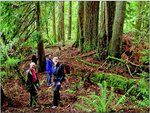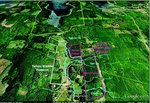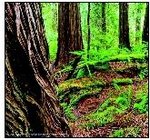Eighty acres of mature forest in the Tarboo Valley was permanently preserved last week through a joint project of Northwest Watershed Institute (NWI) and Jefferson Land Trust (JLT).
Through the …
This item is available in full to subscribers.
We have recently launched a new and improved website. To continue reading, you will need to either log into your subscriber account, or purchase a new subscription.
If you had an active account on our previous website, then you have an account here. Simply reset your password to regain access to your account.
If you did not have an account on our previous website, but are a current print subscriber, click here to set up your website account.
Otherwise, click here to view your options for subscribing.
* Having trouble? Call our circulation department at 360-385-2900, or email our support.
Please log in to continue |
|



Eighty acres of mature forest in the Tarboo Valley was permanently preserved last week through a joint project of Northwest Watershed Institute (NWI) and Jefferson Land Trust (JLT).
Through the binding legal protection of a conservation easement granted by NWI to JLT, the forest is conserved for wildlife habitat, clean water and sustainable forestry. The project marks the successful culmination of a larger forest conservation effort, totaling 238 acres, that began in partnership with Leopold-Freeman Forests LLC six years ago and represents one of the largest conservation easement projects completed to date in East Jefferson County.
With help from conservation lenders, including the Wildlife Forever Fund and local residents, NWI purchased a 78-acre forest parcel in 2011. The previous owner was planning to clearcut and sell the land for development, according to Peter Bahls, director of the Port Townsend-based nonprofit NWI.
Sorn Nymark, the owner of ANE Forests of Puget Sound, lived on a 1,000-acre estate in Denmark, Bahls noted. Over six years of discussions, NWI persuaded Nymark to sell the property with the forest intact, splitting the purchase of about 200 acres with Leopold-Freeman Forests. In the spring of 2014, NWI purchased an adjoining 2-acre tract that was threatened by development, for a total NWI ownership of 80 acres.
The 238 acres of forest include numerous tributaries to Tarboo Creek, the main freshwater source of Dabob Bay, two miles downstream.
"Conserving forestland is key to protecting the water quality for wild coho and chum salmon in Tarboo Creek, as well as the productive oyster and clam beds of Tarboo-Dabob Bay," said Judith Rubin, NWI stewardship director.
$620,000 DONATED
To repay the loans and to cover the cost of placing a conservation easement on the property, NWI needed to raise $620,000 by September 2014. More than half of the funding was granted through Jefferson County's Conservation Futures Program. Over two years, JLT was granted $334,000 from the program to purchase the easement from NWI.
NWI raised the remaining funds from private donors and foundations. Over the past three years NWI led groups on tours and hosted fundraisers. More than 100 people, most of them Jefferson County residents, as well as several foundations, including the Mountaineers Foundation and Wildlife Forever Fund, donated the remaining $286,000 needed, said Bahls.
The 80-acre Tarboo Forest, which forms a new addition to NWI's Tarboo Wildlife Preserve along Tarboo Creek, serves as a model for alternative forestry methods, supporters say.
"We are looking to demonstrate that it is possible to restore old-growth forest habitat conditions, while also providing some jobs and high-quality forest resources - kind of a middle ground between industrial clear-cuts and 'no touch protection," said Bahls. The forestry plan was developed by Kirk Hanson, forester for Northwest Natural Resources Group (NWNRG). The forest is certified by the Forest Stewardship Council.
The conservation easement protects the forest's volume of timber as of a 2011 timber cruise by Cronin Forestry, but allows for selective harvest of some of the additional growth since then.
The conservation effort also represents a practical way for people to offset their carbon emissions locally and take a small step to combat global warming, Bahls noted. According to a carbon assessment done by NWNRG, the protected forest is storing at least 37 metric tons of carbon per acre. "This level of carbon protected on the forest as a whole is equivalent to the annual C02 output of over 2,000 passenger vehicles," said Bahls. "In effect, every protected acre offsets about seven years of an average American's carbon emissions."
CARL'S FOREST
Another key partner in the effort is Leopold-Freeman Forests. As a matching contribution to Jefferson County's grant, the forestry company donated a conservation easement to JLT that permanently safeguarded its adjoining 158 acres for wildlife habitat and sustainable forestry.
The Leopold-Freeman forestland, known as "Carl's Forest," is owned by the Scott and Susan Freeman family, who named the tract in honor of Susan's father, Carl Leopold - a son of renowned conservationist Aldo Leopold - who had an abiding love for forests and conservation work. The Freeman family began working with NWI and JLT a decade ago to restore Tarboo Creek where it flows through their property.
"We are delighted to be working with Northwest Watershed Institute and Jefferson Land Trust to preserve a large tract of forestland in the Tarboo Valley," Susan Freeman said in a statement.
Sarah Spaeth, JLT executive director, said the project "fits well with the goal of conserving working forests, which was a priority identified by the community as they helped us develop our 100-year-vision conservation plan for Jefferson County."
To date, more than 600 acres along Tarboo Creek and more than 2,000 acres within the Dabob Bay Natural Area have been protected by a large coalition of conservation organizations, landowners and public agencies. "We are fortunate to live in a part of the world that can still support salmon runs, productive shellfish beaches and native forests," said Bahls.
NWI is planning a celebration event featuring cider, salmon and clams at the Tarboo Wildlife Preserve for supporters later this fall, with details still to be announced.
"Conserving forestland is key to protecting the water quality for wild coho and chum salmon in Tarboo Creek..."
Judith Rubin NWI stewardship director